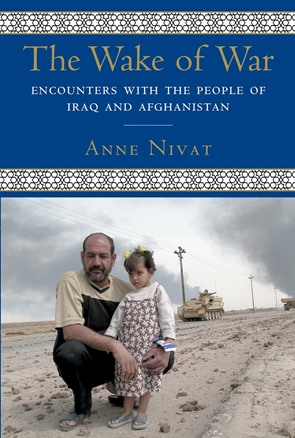Description
In the spring of 2003, acclaimed journalist Anne Nivat set off from Tajikistan on a six-month journey through the aftermath of the American invasion and occupation of Afghanistan and Iraq. Nivat felt compelled to meet and write about the lives of everyday people, whom she allows to speak in their own voices, in their own words--words of hope, sadness, anger, and, above all, the uncertainty that fills their everyday lives. Her new Preface for the paperback edition looks at the situation in Iraq today.
About the Author
Anne Nivat is an award-winning French journalist and war correspondent who has covered conflicts in Chechnya, Iraq, and Afghanistan. She is known for interviews and character portraits in print of civilians, especially women, and their experiences of war.Nivat completed her doctorate in political science after education at Paris Institute of Political Studies, or Sciences Po, in Paris.Anne Nivat became an expert on Russia politics. Her first book was about Russian media during the period of glasnost in the former Soviet Union, the dissolution of country, and the aftermath until 1995 (Anne Nivat, Quand les médias russes ont pris la parole : de la glasnost à la liberté d'expression: 1985-1995, published in 1997). After a stay at Harvard University in the Davis Center for Russian and Eurasian Studies (1997-1998), she went to Russia and reported from Chechnya in 1999.She said she was influenced by Polish journalist Ryszard Kapuściński, whom she later met before his death, and the well-known Italian journalist Curzio Malaparte, who covered the Eastern front during World War II and wrote his accounts in the books 'Kaputt' (1944) and 'The Skin' (1949).She speaks several languages besides her native French and learned Russian and English, as wellas a working knowledge of Arabic.Nivat began her reporting career at Radio Free Europe/Radio Liberty and Transitions magazine in Prague, where she worked for three years between 1995 and 1997, including a stint under Michael Kaufman, a New York Times foreign correspondent and editor, while he was on leave.As a journalist, Anne Nivat is most known for her reporting from Chechnya in 1999-2000 where she worked for Ouest France and as a special correspondent for Libération. Nivat traveled to Moscow in September 1999, and when the Russians invaded Chechnya, she applied as a journalist for access but was denied. She gained access to the war zone by traveling there disguised as a Chechen woman and reported independently from Russian control. Nivat was in Chechnya for 4 months while she intermingled and blended with the local population and reported on the conflict during a ban on journalists until she was picked up by the Russian Federal Security Service and expelled. She says she believes her success in Chechnya was based on several factors:The fact that I am a woman helped me a great deal covering this war. No one pays attention to a woman. Whereas if you are a man, you might be arrested at any time. Also, Dan (Williams, Moscow correspondent for the Washington Post,) doesn't speak Russian. The three elements which played in my favor were the fact that I speak Russian, the fact that I am a woman, and the fact that I am a part of the written press — I didn't need microphones. And the fourth element is luck.Chechnya is where she began her career as a war correspondent, and she said it was also her worst war experience as she survived Russian military bombardment.Since 2004, she has worked for Le Point, a weekly French news magazine, and has also written for Le Soir and Le Nouvel Observateur, as well as the French Huffington Post. Her English-language journalism has appeared in the USA Today, US News & World Report, Washington Post, New York Times, and Nieman Reports. For the New York Times, she wrote a piece called "Life in the 'red zone'", which is about her experiences as a war correspondent in Iraq and is included in her French-language book about Iraq. She has also written about Afghanistan by comparing the Canadian soldiers who invited her to their camp and the civilians with whom they dealt.In 2012, her Russian visa was annulled and she was expelled once again shortly after an interview with the Russian opposition and before the presidential election. Days later, the immigration officer was fired and the Russian ambassador apologized and invited Nivat back to Russia. Her account was published by the New York Times.
